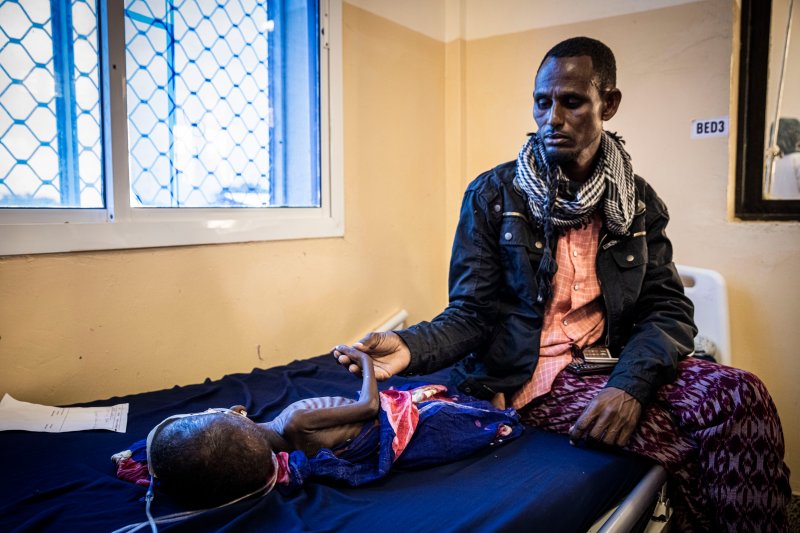|
Getting your Trinity Audio player ready...
|
Writes Norma Tsopo
MUTARE – Town dwellers are not being spared the vagaries of the El Nino-induced hunger that has begun to force families to skip meals across the country after a failed 2023/24 farming season.
A caregiver who is supervising the care of two infants in Zimunya Township, which lies just 20 kilometres from Mutare, Zimbabwe’s third biggest city, told journalists during a media tour organised by the United Nations Children’s Fund (UNICEF) and hosted by the Ministry of Health and Child Care (MoHCC) to Mutare Rural recently that the current drought had driven up malnutrition among poor and low-income families in the peri-urban centre.
Regina Chidziya (32) wore a gloomy face as she narrated the sad state of health of two infants under her supervision.
“I have two children under my care – 6 months and 12 months, who are malnourished and stunted. Sadly, the little ones are from the same family as they are paternally related and their parents are still young and not employed, so food is a big challenge for them.”
This comes as rain-fed urban agriculture from where many families would supplement their grain supplies was just as adversely affected by the poor rains as their rural subsistence farming activities.
“People in Zimunya are affected by El Nino-induced hunger in a way that we never anticipated. During the years of good rains, people here used to grow crops on their small portions of land and we would teach mothers how to prepare meals with what is readily available and healthy but this season there was nothing even small gardens went dry.
“Some people also depended on farms at their rural homes which they would harvest and save for food but because of the drought they are at zero and have to buy everything hence the children suffer,” Chidziya said.
With her arms firmly fixed together, forming a diamond shape, Chidziya who has 86 children of 0-5 years under her supervisory care and covers a section of 108 houses, explained that they detect possible malnutrition cases as caregivers using the Medium Upper Arm Circumference (MUAC) measurement adding that several children had been dropping rapidly over the past few months.
“We measure the Medium Upper Arm Circumference at which 12.5cm + is the normal and 12.4cm and below is a cause of concern and we say the child is malnourished and needs attention. From the recordings I did last month, most children were dropping in weight and MUAC, with some children dropping from their normal which is the green on the health card to orange. We refer cases which record red, which is the dangerous stage, to the clinic,” she said.
Bridget Buzuzi, Mutare District Nutritionist with MOHCC said some well-to-do families are not being spared the problem of malnutrition among children due to ignorance about healthy diets.
“Some people in our communities might have money but they lack knowledge in terms of nutrition, so we teach them on nutrition and healthy foods that children should eat,” Buzuzi said adding that the Ministry of Health and partners have many preventive measures to curb malnutrition.
“Besides treating, we have care groups under the supervision of community-based caregivers where mothers are taught how to fortify their children’s food and how to prepare healthy meals,” she said.
UNICEF, has in collaboration with the government of Zimbabwe and partners, since sent a global appeal for USD 84.9 million to respond to the El Nino emergency in Zimbabwe.
According to UNICEF, the appeal focuses primarily on ensuring continued access to integrated health, water sanitation and hygiene, nutrition, education, and child protection services for children and their caregivers.
Dr Nicholas Alipui, UNICEF Representative in Zimbabwe said they are concerned with the vulnerability of children in the current emergency where access to clean water and poor diet has increased the risk of malnutrition. He also added that there is a need for preventive measures to stop deaths in months to come.
“We are particularly concerned about the vulnerability of children in this current emergency. Decreased access to clean water and poor diet heightens the risk of malnutrition and diarrheal diseases among children and impacts their rights to education and protection with the full impact of these interesting factors expected to manifest only later. Hence the need for a front-facing preventive strategy to avert excess deaths in the months to come,” he said.
DR Alipui also stressed that funding will assist mitigate child Morbidity and Mortality as well as preventive measures
“The funding will assist mitigate child Morbidity and Mortality, prevent Malnutrition and provide treatment, enhance water access, ensure continuous learning of children, and protect children against abuse and exploitation. It will also help strengthen the resilience of households to deal with the crisis,” stressed Dr Alipui.






